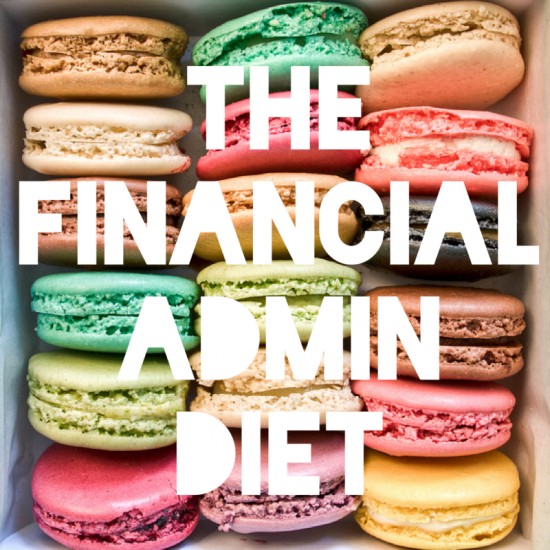Miss Thrifty8 May 17, 2016

How do you keep your finances on track? The Little Guide to Easy Financial Admin is a pocket-sized book, filled with quick and easy tips and hints. It is free to download from Standard Life Savings, who asked me to share some of my must-dos. The book comes on the heels of new research showing that in the UK, 10% of people don’t review their finances. In fact, just 26% of us regularly put time aside to keep their bank accounts, savings and investments in check. The rest of us appear to snatch time when we can.
Admin of any kind can be dreary, but it pays to take a few minutes out of your day to look after your money. I have learned – the hard way – that unless I pull my finger out and keep the household finances up to date, they can spiral out of control very quickly. (My tendency to ram-raid charity shops doesn’t help.)
With a family and a full-time job, time is short and I organise my financial admin with the help of recurring alerts in my Google Calendar. I have to, really: time just whooshes past otherwise and before I know it, I’m neck-deep in overdraft.
Here is my Financial Admin Diet. I like the diet comparison. Instead of peeling off the pounds, you pile them on. Like Complan, but tastier.

Log all spending
I use the Notes app on my phone to make entries when I’m out and about. It isn’t the most sophisticated expense logbook, but it’s free – and in truth, I spend so little that I rarely make more than a couple of entries per day. When I get home, I add any phone entries to a homemade Excel spreadsheet, to provide an up-to-date total of what is in and out of my accounts.
If you lack the inclination to faff around with Notes and maintain an Excel spreadsheet, however, may I make an alternative suggestion? It is this: a piece of American software called You Need A Budget. YNAB is hugely popular in the States, and claims to combine “a simple, effective methodology with award-winning software to turn you into a finance superhero.”
Although it has been created with American users in mind, You Need A Budget also has a growing fanbase of UK users. Debt Camel has some detailed reviews from UK users of the tool, if you would like to learn more. Although this is paid-for software ($5 a month – which works out at roughly £3.50-£4.00), as a new user you will get a 34-day free trial.
Top up the pound jar
The other daily money habit I have centres upon a big old Heremes jars. Every day this year, since 1 January, I have been adding to it at the rate of a pound coin a day, or seven pound coins per week. Do this and it’s the equivalent of a savings stamp scheme, for Christmas: by 1 December, you’ll have more than £300 to spend on presents, festive food and travel. Best of all, planning ahead in piecemeal like this takes the worry out of budgeting for Christmas.
Again, this is a very simple habit: money is tight this year while I’m on maternity leave, so I’m playing it safe. If you want to give this a go but would like to rev it up some, consider the 1p Saving Challenge instead. Skint Dad writes about it here, and Oh So Amelia has a free printable here, which you can tape to your jar. With a 1p Saving Challenge, the amount of money you add daily increases slowly – and after a year, you’ll have more than £650 in that jar.

Cross-check transactions
Every week I cross-check my spending log with my online banking statements, to ensure that all the entries match up. This is a habit like teeth-flossing: everybody knows you are supposed to do, but how many people make the effort to do so?
Most of the time, everything matches up beautifully, but the time spent on this activity more than pays for itself. A few months ago I noticed a couple of rogue Amazon transactions on a Visa card – definitely not mine! – and with one phone call to Visa, was able to get the money refunded and a new card sent out, pronto.

Hold a household summit
At the end of every month, my husband and I sit down at the kitchen table, review the month’s spending and run through our income and outgoings for the following month. This is quite an American thing to do, actually: there is an entire blogging sub-genre dedicated to “couple money.” The idea is that with money issues contributing to nearly half of divorces, full and frank discussion of your household finances promotes marital health as well as financial health. It doesn’t come easily to a Brit though, talking OUT LOUD about the intricacies of your personal finances. It can be awkward – even when it’s sitting down with your nearest and dearest.
For us, it’s a practical measure: my husband is self-employed and I earn money from a number of side hustles in addition to my day job, so our income varies month to month and we need to moderate budgets in line with this. Also, despite being married we keep our finances separate (probably the subject of another post!), so it’s useful to get some transparency on what the other one is up to. Finally, it provides a platform for the discussion of any longer-term ideas: how much we should be overpaying on the mortgage, for example.
Budget for the month ahead
Although most of your outgoings should be fixed, in the form of standing orders and direct debits, there are always one-off payments and discretionary spends to consider. I prefer to plan as much as possible ahead of time, again with a trusty Excel spreadsheet. This month is a case in point: I’m currently on statutory maternity pay and my husband had to take some time off work in April, so we are running a tight(wad) ship in May.
Plan meals and make one large grocery shop
I prefer to do my grocery shopping in one big go at the beginning of every month, to get the best value for money by buying in bulk, avoiding impulse buys and minimising food waste. Planning goes into this baby: I sit down beforehand, draw up meal plans and comb through coupon sites and cashback apps such as CheckoutSmart for freebies and money-off deals. I also comb through mySupermarket, not just to scoop up the best deals and offers, but also to work out which supermarket will provide best value. When we lived in Yorkshire I had two supermarkets on the doorstep, but now I have all of them bar Lidl within driving distance.
When grocery shopping, I buy as much from the freezer section as possible. Frozen vegetables are a fraction of the price of their fresh equivalents, just as (if not more) nutritious – and they keep.

Review direct debits and standing orders
Last time I did this, I discovered that we had ended up overpaying council tax to the tune of £265. Ugh! I wrote to the council and requested a refund, which was duly sent. I also remonstrated with our energy provider, after they hiked our monthly direct debit without due cause.
When reviewing your direct debits and standing orders, begin with your bank accounts. Go through them online, check the amounts and cancel off any old ones. Don’t stop there though: log into online accounts for utilities and other bills, to check account activity and ensure you are paying appropriate sums.

Switch energy tariffs
This takes minutes to do, when you use a price comparison site such as uSwitch. And the average consumer who switches their gas and electricity to a new deal, when their old deal nears expiry, saves hundreds of pounds on average. So why wouldn’t you?
Get the best insurance deals
Ditto for insurance. Although providers write to customers when contracts near expiry, I also keep reminders and alerts in my Google Calendar. More than half of drivers leave it until the week of renewal to shop around, but this isn’t good for the wallet: the closer the renewal date, the more expensive the deals become.
Check your tax code
If you are in employment, you will get a PAYE coding notice letter from HMRC every year. Always read it carefully, and take action if it doesn’t seem right. Last year HMRC, in its wisdom, allocated me a bananas tax code that would have given me a tax-free allowance of just £2,700, instead of the standard personal allowance of £10,600. One phone call sorted it (thank goodness).
Set goals for the year ahead
Overpay your mortgage? Build an emergency fund? Save for a thrifty wedding or a holiday or a house deposit? Once you know where you are going, you can work out which road will get you there. When I’m in full-blown savings mode, I set up calendar alerts and monthly standing orders to ensure I stay on target. To keep yourself motivated, you can even download and customise free savings thermometer printables like this one.
Whew! Now I’ve written it all down, it seems like a lot. However if there anything else we could or should be doing, I’m sure you guys will let me know… (Gulp.)
Looking for inspiration for your own financial admin routine? You can download The Little Guide to Easy Financial Admin here.
This post was produced in collaboration with Standard Life.
Image credit: Stefano Bertolotti via flickr.com. Used under a Creative Commons licence.
8 Responses to “The Financial Admin Diet: Little & Often”
Lee Balders says:
Complan – that really takes me back to the 80s! 🙂 This is a great post, lots for beginners but it’s also good for those already on their way to see what someone else does. One thing I don’t do that I know I need to is meal planning… I’m convinced, but just haven’t built up enough steam to do it yet!
May 17, 2016 at 7:29 am
Miss Thrifty says:
I love, absolutely LOVE meal planning. Go on Lee, you know you want to really! 😉
May 22, 2016 at 12:49 am
Rose C says:
What a great post. I thought I was reasonably money-savy but I only actually do my monthly budget. I’ll certainly be taking some of these tips on board!
May 23, 2016 at 10:21 am
Karen James says:
Planning is the key to healthy financial living.
Cheers,
Karen
http://msfs.co.uk/
May 24, 2016 at 1:39 pm
Dean says:
I have been using YNAB for a long time and I rate it highly. I think you have to be committed to it to get the best from it – I paid off credit card debt from uni times and saved for our wedding and home improvements etc. The awareness it gives you is breathtaking. If you try to use it, make sure you read their blog, watch the guides and other vids on YouTube and even the podcast. It helps understanding the concept easier (it can be a little difficult to get into the correct frame of mind) and keeps you going.
May 25, 2016 at 12:37 pm
Sue King says:
I am massive fan of thrift and often use discount code sites to save money off my shopping and you can really save serious money especially when you start stacking the codes! My fave discount site is https://www.myfavouritevouchercodes.co.uk/ as they have all the codes but also donate 20% of their profits to charity so I am saving whilst raising money for charity 🙂
June 8, 2016 at 4:39 pm
Paul Ball says:
Great Article! I’ve been using YNAB for a few years now but haven’t used it to the best of its abilities. Your articles reminded me to revisit it and get the most out of it.
August 5, 2016 at 11:33 am
Jo Maine says:
Very useful article. And My Favourite Voucher Codes is good I agree. Another very useful site that I use regularly is http://www.lovemyvouchers.co.uk/
December 14, 2016 at 5:53 pm